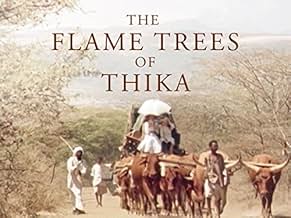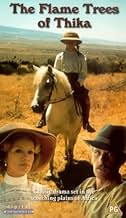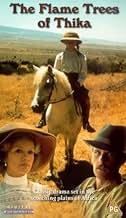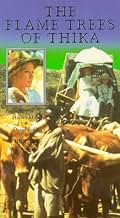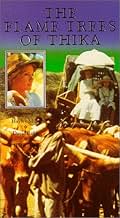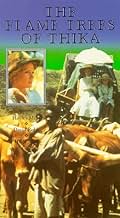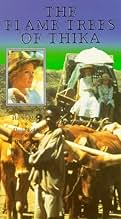Elspeth's family starts a Kenyan coffee plantation. She befriends locals and expats, experiencing nature's beauty and cruelty. An affair between Lettice Palmer and a safari guide runs parall... Read allElspeth's family starts a Kenyan coffee plantation. She befriends locals and expats, experiencing nature's beauty and cruelty. An affair between Lettice Palmer and a safari guide runs parallel. World War I changes Elspeth's exciting life.Elspeth's family starts a Kenyan coffee plantation. She befriends locals and expats, experiencing nature's beauty and cruelty. An affair between Lettice Palmer and a safari guide runs parallel. World War I changes Elspeth's exciting life.
- Nominated for 3 BAFTA Awards
- 3 nominations total
Browse episodes
Featured reviews
10emuir-1
I first saw the Flame Trees of Thika 40 years ago and had forgotten what a superb program it was. I just saw it again on Acorn TV and it is a real feast for the eyes. Made on location in Kenya with actors playing their own nationality, Scots playing Scots, Dutch playing South African Boers, and Kenyan actors and native tribespeople playing the Kenyans, and real wildlife (lots and lots of wildlife) . The location scenery is stunning and amost a travelogue for Kenya. Ben Cross, who passed away last year was in his 30's and ruggedly handsome as a horse trader/safari leader. The acting was top notch. Although set in the early 20th centurywhen Kenya was being colonised by aristocratic second sons and former military officers of the British empire, this is not The Happy Valley of White Mischief - more the second class settlers who are very hard working farmers struggling to establish coffee plantations and farm animals and doing the work themmselves, tatherr than appointing stewards. I plan to buy the DVD to keep on hand for when the series on no longer available on TV.
Unfortunately the first episode on Acorn does not have captions, and has an inferior picture, but I persevered and the subsequent episodes had both captions and a better picture. There is a disclaimer to the effect that certain scenes and lanaguage are counter to what is acceptable today and may offend some people. I don't know what was offensive - colonial rule in East Africa was what it was and we did not see any atrocities or brutalities carried out by the white settlers, nor was there any bad language or graphic sex, so the series could be enjoyed by the whole family.
Unfortunately the first episode on Acorn does not have captions, and has an inferior picture, but I persevered and the subsequent episodes had both captions and a better picture. There is a disclaimer to the effect that certain scenes and lanaguage are counter to what is acceptable today and may offend some people. I don't know what was offensive - colonial rule in East Africa was what it was and we did not see any atrocities or brutalities carried out by the white settlers, nor was there any bad language or graphic sex, so the series could be enjoyed by the whole family.
To even think that this show is colonialist or smug towards Africans is completely ridiculous and insane at best.
The show couldn't be more positive towards Africans and negative towards white people.
This is one of these strangely manipulative but innocent looking guilt-trip-shows that are very popular in Germany or the USA.
Virtually all white people - besides 2 or 3 exceptions - are ignorant, patronizing and mean while virtually every African - besides 1 exception at best - is a good behaved hard worker.
The supposedly good will of the show doesn't just stop at the skin color of people.
It really likes to contrast super-capable, strong, confident (blonde) women with whiny, hysterical (dark haired) women.
In other words, the more noble the aim, the more pathetic the result.
I even doubt, however, the oh so noble and moral goal of the show. It just feels very wrong-headed and under-complex for the depth of it's topics.
The show couldn't be more positive towards Africans and negative towards white people.
This is one of these strangely manipulative but innocent looking guilt-trip-shows that are very popular in Germany or the USA.
Virtually all white people - besides 2 or 3 exceptions - are ignorant, patronizing and mean while virtually every African - besides 1 exception at best - is a good behaved hard worker.
The supposedly good will of the show doesn't just stop at the skin color of people.
It really likes to contrast super-capable, strong, confident (blonde) women with whiny, hysterical (dark haired) women.
In other words, the more noble the aim, the more pathetic the result.
I even doubt, however, the oh so noble and moral goal of the show. It just feels very wrong-headed and under-complex for the depth of it's topics.
This is an extremely well crafted mini series that depicts one colonial British family's experiences in Kenya. The African wilderness scenery is absolutely breathtaking. It is based on one of three autobiographical books by Elspeth Huxley. I found the series to have a similar flavour to the film Out of Africa (starring Meryl Streep & Robert Redford), another Kenyan coffee plantation saga based on the tale of the Danish woman, Karen (Isak) Dinesen Blixen.
The series chronicles the life experiences of the Grants, an unconventional English family consisting of the mother Tilly, father Robin, and daughter Elspeth. It shows their struggles as they endeavor to establish a coffee plantation in Kenya, their interactions with both the African natives and the other British colonials...all mainly as seen from the perspective of the young Elspeth. The life they establish in Kenya is interrupted by the onset of World War I.
I tuned in to the series mainly because I am quite a fan of Hayley Mills, who is very effective here in her role as Tilly Grant, the lovely mother coping with the challenges of life in an exotic country. Holly Aird is particularly engaging as her inquisitive daughter, Elspeth, who makes friends both from among the British and the native Africans. David Robb plays her handsome father, Robin Grant. Sharon Maughan is the bored Lettice Palmer who has an affair with a safari guide, and Ben Cross the know it all newcomer, Ian Crawfurd.
Personally, I am not much of an advocate of past British (or other European) colonialism which intruded their presumed superior culture onto the supposedly lesser ignorant & savage peoples of Africa, India, or wherever. The efforts of the British to make a good life for themselves were sometimes to the detriment of the native people's. While I am no expert on the historical accuracy of this particular depiction, the natives are portrayed as superstitious, with a possible air of the condescension typical of such colonial tales.
Enthusiasts of the series might not be pleased to read my criticisms of colonialism, but they are true, nevertheless. Despite my general misgivings about such ethical issues, I am ranking this generally well made series quite highly because it does paint such an interesting portrait and is a captivating story of this family's experiences.
The series chronicles the life experiences of the Grants, an unconventional English family consisting of the mother Tilly, father Robin, and daughter Elspeth. It shows their struggles as they endeavor to establish a coffee plantation in Kenya, their interactions with both the African natives and the other British colonials...all mainly as seen from the perspective of the young Elspeth. The life they establish in Kenya is interrupted by the onset of World War I.
I tuned in to the series mainly because I am quite a fan of Hayley Mills, who is very effective here in her role as Tilly Grant, the lovely mother coping with the challenges of life in an exotic country. Holly Aird is particularly engaging as her inquisitive daughter, Elspeth, who makes friends both from among the British and the native Africans. David Robb plays her handsome father, Robin Grant. Sharon Maughan is the bored Lettice Palmer who has an affair with a safari guide, and Ben Cross the know it all newcomer, Ian Crawfurd.
Personally, I am not much of an advocate of past British (or other European) colonialism which intruded their presumed superior culture onto the supposedly lesser ignorant & savage peoples of Africa, India, or wherever. The efforts of the British to make a good life for themselves were sometimes to the detriment of the native people's. While I am no expert on the historical accuracy of this particular depiction, the natives are portrayed as superstitious, with a possible air of the condescension typical of such colonial tales.
Enthusiasts of the series might not be pleased to read my criticisms of colonialism, but they are true, nevertheless. Despite my general misgivings about such ethical issues, I am ranking this generally well made series quite highly because it does paint such an interesting portrait and is a captivating story of this family's experiences.
Fabulous min-series making you wanting more. Magnificently shot capturing the wilds of Africa and the superstitions of its people. A story seen through the young eyes of Elspeth displays why these types of British mini-series are so wonderful even after almost 25 years to watch again and again. Great supporting performances by Haley Mills and Sharon Maughan lights up the storyline and it is a shame they did not continue the series onto the next Huxley autobiographical book. It was a pleasant surprise to see that Roy Ward Baker was also the director for one my favorite Titanic movies, 'A Night to Remember'. A bit of trivia that had escaped me all these years. If you enjoyed 'Out of Africa' by Dinesen, you will surely enjoy this series. The quality of the DVD and extras were less than stellar but it does nothing to diminish the beauty of the story, the acting, or the beautiful wilderness of Africa.
Sometimes you watch a bit of something, and you just KNOW you're seeing something special.
I first saw this series around 20 years ago as a weekly mini-series on PBS. The wonderful story, great acting, beautiful scenery and haunting music has stayed with me. When I saw the video at our local library I was happy to renew my acquainenance with Elspeth and her family in Kenya. The story plays just as well 20 years later.
Thanks to all who had a part in "The Flame Trees of Thika" for giving us such a gift.
I first saw this series around 20 years ago as a weekly mini-series on PBS. The wonderful story, great acting, beautiful scenery and haunting music has stayed with me. When I saw the video at our local library I was happy to renew my acquainenance with Elspeth and her family in Kenya. The story plays just as well 20 years later.
Thanks to all who had a part in "The Flame Trees of Thika" for giving us such a gift.
Did you know
- TriviaAlthough billed as a novel, Elspeth Huxley's 1959 book was in fact a semi-autobiographical work, based on her upbringing in the former British East Africa. She corresponds to the Holly Aird character.
- How many seasons does The Flame Trees of Thika have?Powered by Alexa
Details
Contribute to this page
Suggest an edit or add missing content


